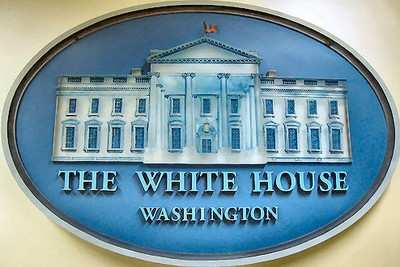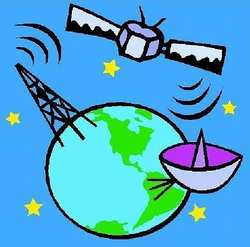Fri, May 08, 2009
$17 Billion Cut... But Trillions More Spent Elsewhere
The Obama Administration, in the process of spending trillions
of dollars for all manner of programs and projects, is trumpeted
the 17 Billion dollars it is trying to cut from the Federal Budget.
Rather than try to digest them all en masse, we'll look at each of
them one at a time and allow you to make up YOUR mind as to the
rationale and wisdom for the decisions included below. Herewith;
another of the programs on the chopping block that has an aviation
or aerospace connotation.

From the 'Terminations, Reductions, and Savings' document
published this week by the OMB, as part of the FY 2010 US
Budget:
Proposal: The Administration proposes to
terminate the Air Force's Transformational Satellite (TSAT) program
because of significant cost increases and slips in schedule. It
intends instead to buy additional Advanced Extremely High Frequency
(AEHF) satellites, which offer maturity and stability in technology
development and in design. The TSAT program was envisioned as a
constellation of four satellites and a spare -- with supporting
ground infrastructure -- designed to provide strategic
communications and Internet-like capabilities to deployed
forces.
 Justification: The TSAT
program has suffered from funding instability, and increasing costs
and development delays. Moreover, the program's schedule has
slipped significantly. The Government Accountability Office (GAO)
noted that the revised date for the launch of the first satellite
was 2019 -- almost four years later than previously scheduled.1 GAO
further noted that the launch delay was supported by the Office of
the Joint Chiefs of Staff, which had concerns about TSAT's
development progress and synchronization with other programs. Also,
in recent testimony before the Congress regarding alternate budget
scenarios, the Congressional Budget Office pointed to the
cancellation of TSAT as a potential cost-saving measure.
Justification: The TSAT
program has suffered from funding instability, and increasing costs
and development delays. Moreover, the program's schedule has
slipped significantly. The Government Accountability Office (GAO)
noted that the revised date for the launch of the first satellite
was 2019 -- almost four years later than previously scheduled.1 GAO
further noted that the launch delay was supported by the Office of
the Joint Chiefs of Staff, which had concerns about TSAT's
development progress and synchronization with other programs. Also,
in recent testimony before the Congress regarding alternate budget
scenarios, the Congressional Budget Office pointed to the
cancellation of TSAT as a potential cost-saving measure.
Based on a recent revision of the program, the estimated
investment cost for the current TSAT program is $19.4 billion. This
represents an increase in the cost for each satellite of roughly
$400 million over the original estimate. Significantly, the latest
TSAT configuration has substantially less technical capability than
what was proposed for the original configuration. The Air Force has
spent approximately $3.3 billion on the TSAT program through 2009.
A preliminary assessment done by the Department of Defense (DOD)
anticipates savings of about $1.5 to $2.5 billion dollars though
2015 as a result of procuring AEHF satellites in the place of
TSATs.
Procuring more than the four AEHF satellites currently under
development will allow DOD to continue upgrading its communications
satellite inventory with less expensive satellites than TSAT. AEHF
satellites will provide a significantly higher data throughput
capacity than protected satellites currently in use. Also, they
have enhanced features to make them more survivable, jam-resistant,
and secure from eavesdropping than current protected satellites.
Most importantly -- and as noted by GAO -- AEHF component
technologies are mature and their design appears stable.
More News
Also: ANOTHER Illegal Drone, KidVenture Educational Activities, Record Launches, TSA v Shoes The Senate confirmed Bryan Bedford to become the next Administrator of the FAA, in a ne>[...]
Also: Sully v Bedford, Embraer Scholarships, NORAD Intercepts 11, GAMA Thankful Middle Georgia State University will be joining the Federal Aviation Administration’s fight ag>[...]
Also: DarkAero Update, Electric Aircraft Symposium, Updated Instructor Guide, OSH Homebuilts Celebrate The long-awaited Sonex High Wing prototype has flown... the Sonex gang tells >[...]
Also: Sully v Bedford, Embraer Scholarships, NORAD Intercepts 11, GAMA Thankful Middle Georgia State University will be joining the Federal Aviation Administration’s fight ag>[...]
30-Year USCG Veteran Aviator Focusing On Member Benefits The Vertical Aviation International Board of Directors announced its new leadership officers in April, and all began their >[...]
 Airborne 07.11.25: New FAA Boss, New NASA Boss (Kinda), WB57s Over TX
Airborne 07.11.25: New FAA Boss, New NASA Boss (Kinda), WB57s Over TX Airborne-Flight Training 07.10.25: ATC School, Air Race Classic, Samson School
Airborne-Flight Training 07.10.25: ATC School, Air Race Classic, Samson School Airborne Affordable Flyers 07.03.25: Sonex HW, BlackShape Gabriel, PRA Fly-In 25
Airborne Affordable Flyers 07.03.25: Sonex HW, BlackShape Gabriel, PRA Fly-In 25 Airborne-Flight Training 07.10.25: ATC School, Air Race Classic, Samson School
Airborne-Flight Training 07.10.25: ATC School, Air Race Classic, Samson School Rick Kenin New Board Chair of VAI
Rick Kenin New Board Chair of VAI




